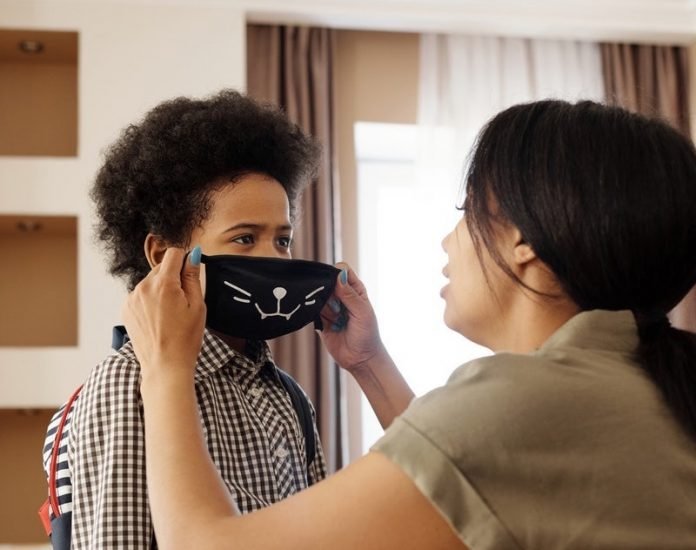
The COVID-19 pandemic demands that we remain vigilant in our daily lives as we return to everyday activities. We can each take some simple steps to protect ourselves, our families, and our communities.
The steps are:
- Get a COVID-19 vaccine.
- Wash your hands often with plain soap and water.
- Cover your mouth and nose with a mask when around others.
- Avoid crowds and practice social distancing (stay at least 6 feet apart from others).
Here are some ways you and your family can help slow the spread of coronavirus disease.
Help Stop COVID-19 by Getting Vaccinated
The U.S. Food and Drug Administration has approved Comirnaty for the prevention of COVID-19 in people ages 16 and older.
The vaccine has the same formulation as the Pfizer-BioNTech COVID-19 Vaccine that continues to be available under emergency use authorization (EUA), including for people ages 12 to 15 and for the administration of a third dose in certain immunocompromised individuals.
The FDA has also authorized two additional COVID-19 vaccines for emergency use in people 18 and older. Studies show that COVID-19 vaccines are effective at keeping you from getting COVID-19.
Getting a COVID-19 vaccine will also help keep you from getting seriously ill even if you do get COVID-19.
Wash Your Hands
The best way to prevent illness is to avoid being exposed (or exposing others) to this virus. First, practice simple hygiene.
Wash your hands regularly with soap and water for 20 seconds – especially after going to the bathroom, before eating, and after coughing, sneezing, or blowing your nose. Learn how to wash your hands to prevent the spread of coronavirus and other illnesses.
If soap and water are not available, the Centers for Disease Control and Prevention recommend that consumers use alcohol-based hand sanitizers containing at least 60% ethanol (also known as ethyl alcohol).
The FDA continues to warn consumers about hand sanitizers that contain methanol, also called wood alcohol. Methanol is very toxic and should never be used in hand sanitizer.
If absorbed through the skin or swallowed, methanol can cause serious health problems, such as seizures and blindness, or even death.
Before you buy hand sanitizer or use some you already have at home, check this list to see if the hand sanitizer may possibly have methanol.
Most hand sanitizers found to contain methanol do not list it as an ingredient on the label (because it is not an acceptable ingredient in the product), so it’s important to check the FDA’s list to see if the company or product is included.
Continue checking this list often, as it is being updated routinely.
The FDA has also expanded the list to include hand sanitizers that contain other dangerous ingredients and products that have less than the required amount of the active ingredient.
The FDA advises consumers not to use hand sanitizers produced by the manufacturers identified on the list. Learn how to find your hand sanitizer on the list and how to safely use hand sanitizer.
Wear a Mask and Avoid Crowds
Avoid crowds and poorly ventilated spaces. Avoid close contact (stay at least 6 feet, or about two arms’ length, away) with people who don’t live with you, even if they don’t appear sick, in both indoor and outdoor spaces.
Some people without symptoms may be able to spread the coronavirus.
If you are not fully vaccinated, the CDC recommends wearing a mask in indoor public places. Wearing masks in public can help to slow the spread of the virus.
They can help keep people who may have the virus and do not know it from transmitting it to others by helping prevent respiratory droplets from traveling into the air and onto other people when you cough, sneeze, or talk.
Wearing a mask over your nose and mouth is required on planes, buses, trains, and other forms of public transportation traveling into, within, or out of the United States and while indoors at U.S. transportation hubs, such as airports and stations.
Donate Blood
Maintaining an adequate blood supply is vital to public health. Blood donors help patients of all ages and kinds – accident and burn victims, heart surgery and organ transplant patients, and those battling cancer and other life-threatening conditions.
The American Red Cross estimates that every two seconds someone in the U.S. needs blood.
If you are healthy and feel well, contact a local donation center to make an appointment. Donation centers are taking steps to make sure donation is safe.
Report Fraudulent Coronavirus Tests, Vaccines, and Treatments
Some people and companies are selling products with fraudulent COVID-19 diagnostic, prevention, and treatment claims.
Fraudulent COVID-19 products can come in many varieties, including products marketed as dietary supplements or other foods, as well as products claiming to be tests, other medical devices, drugs, or vaccines.
So far, the FDA has approved only one treatment for COVID-19, and has authorized others for emergency use during this public health emergency.
If you have a question about a treatment or test being sold online, talk to your health care provider or doctor first. If you have a question about a medication, call your pharmacist or the FDA.
If you care about COVID and inflammation, please read studies about these two anti-inflammatory drugs could boost recovery from severe COVID-19 and findings of why some people with COVID-19 develop severe inflammation.
For more information about COVID and your health, please see recent studies about COVID-19 death in obese people isn’t caused by inflammation and results showing that this hormone drug may help stop COVID-19 inflammation.



